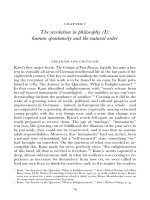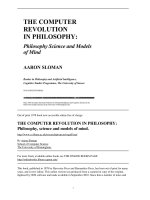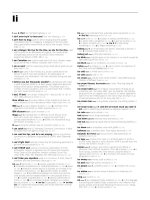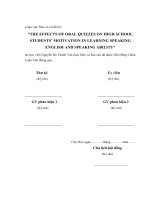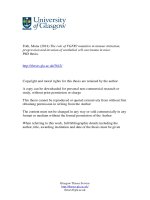The revolution in philosophy (II) - autonomy and the moral order
Bạn đang xem bản rút gọn của tài liệu. Xem và tải ngay bản đầy đủ của tài liệu tại đây (181.35 KB, 21 trang )
The revolution in philosophy (II):
autonomy and the moral order
The antinomy between freedomand determinismset the stage for Kant’s
next revolution in philosophy. The first Critique had established that hu-
man experience resulted from the combination of the spontaneous activity
of the mind with its intuitive (passive) faculties. The spontaneity of the
intellect was underived fromanything else and was not a self-evident
truth or indubitable first principle – it was instead a self-producing, self-
generating activity. In his second () edition of the Critique, Kant had
even gone so far as to claimin a footnote: “The synthetic unity of ap-
perception is therefore that highest point, to which we must ascribe all
employment of the understanding, even the whole of logic, and con-
formably therewith, transcendental philosophy. Indeed this faculty of
apperception is the understanding itself.”
Kant’s related distinction of appearances and things-in-themselves
inevitably raised the question about what exactly Kant had thereby done
to traditional conceptions of morality. If with the aid of pure reason we
could not establish that there were certain values and goods in the created
order that had been intended for us, were we then to become “nihilists”
as Jacobi feared, or were we to admit that what we counted as good and
evil depended only on what we happened to desire, and that therefore
reason could never be more than, as Hume had so famously put it, a
“slave to the passions”?
Kant laid out his answers in a series of books and essays, beginning
with the Groundwork for the Metaphysics of Ethics in , followed by the
Critique of Practical Reason in which was itself eventually followed
quite a bit later by the Metaphysics of Ethics in . The lines of thought
in those books were also developed in a series of independent essays and
carried over into his writings on religion.
Critique of Pure Reason, note; p. .
Part I Kant and the revolution in philosophy
Kant thought the key to answering these questions lay in the prac-
tical necessity for assuming that we are free. The independence of the
normative from the factual in the theoretical sphere required that we
assume that we were free in deliberating about the normative criteria
for making judgments. What role then did this kind of spontaneity of the
normative (its self-generating, non-derivative character) have to play in
the practical sphere, where the results of our judgments are not merely
other judgments but actions?
As physical, embodied beings in the world, we are governed by the
strictly deterministic laws of nature. However, in spontaneously conceiv-
ing of ourselves as acting beings, we must think of ourselves as free. The
key to this, Kant argued, lay in understanding that the difference be-
tween a human action and deterministic event in the world (such as a
piece of knee-jerk behavior) has to do with the normative principle that
the agent is following in performing the action; actions can always be
said to be correct or incorrect, right or wrong. Kant characterized the
normative principle that the agent is acting on as a “maxim,” a subjec-
tive principle of action that the agent follows in her actions, and it is the
character of acting according to maxims that expresses our spontane-
ity in the practical sphere, since an action fundamentally expresses the
agent’s own doing something rather than her being pushed around by
forces external to her.
Although any agent can have various desires and inclinations that she
most certainly does not determine for herself and which can certainly
operate as attractions or incentives to action, what it is that the agent
is doing when she purposefully does anything is determined by what
“maxim” she chooses to act upon, by what she subjectively understands
herself to be doing (even if such understanding is only implicit). We
therefore must think of ourselves as not merely being pushed around
by natural laws (as we surely are in our physical embodied state) but
instead as acting only according to our own representation of a rule or
principle to ourselves. Or, to put it slightly differently, we must conceive of
the laws that govern our actions as self-imposed laws, not laws ordained
Kant’s own usage of the term, “maxim,” and its relations to the other related terms of his moral
theory (“imperative,” “incentive,” “practical law,” and so forth) is not entirely perspicuous and,
so many scholars have argued, not even consistent across all his mature writings. For purposes of
exposition, I shall ignore those scholarly details in this presentation of Kant’s views since I think
that one can indeed make a coherent presentation of the overall view. See Barbara Herman, “On
the Value of Acting fromthe Motive of Duty,” in Barbara Herman, The Practice of Moral Judgment
(Cambridge, Mass.: Harvard University Press, ), pp. –; Henry E. Allison, Kant’s Theory of
Freedom (Cambridge University Press, ); and Onora O’Neill, Constructions of Reason, chapters
–, ;pp.–, –, for excellent representative discussions of the issues involved.
(II): Autonomy and the moral order
for us by anything fromoutside our own activities. The independence
of the normative from the factual or empirical, already so prominent in
the first Critique, thus appears even more sharply in the practical sphere:
since I can always ask myself what I ought to do (or have done) instead
of what I actually happen to do (or have done), I can always ask whether
I should act upon a maximdifferent fromthe one I actually choose; and
I must think of myself as able to do that – think of myself as free – if such
deliberation is to make any sense at all.
Even though I must think of myself as free, however, why must I con-
clude that I really am free? Why should I not conclude that I amdestined
to entertain some kind of deep illusion about myself ? Kant’s answer to
this relied on his distinction between phenomena and noumena. As I ex-
perience myself as a being in the world among other physical beings
in the
world, I cannot conceive of myself as anything except determined by nat-
ural law. What I amas a thing-in-itself, however, cannot be given by such
experience; and my thinking of myself as free is thus to think of myself as
noumenally free, even though I cannot in principle provide any kind of
theoretical proof that I really am free in that sense. Our own freedomis a
presupposition that we must make about ourselves but which we cannot
theoretically defend; it is a necessary condition for conceiving of ourselves
as spontaneous beings, as not merely having a point of view of ourselves
as physical beings in the world but as having a subjective point of view
on the world. Thus, on practical grounds, we must presuppose a belief
about ourselves that on theoretical grounds we cannot prove (and which
fromthe point of view of our experience of nature actually seems to be
false).
My desires and inclinations, my fears and needs, can exert a pull
on me as a “sensuous” being, as Kant described our embodied state.
They cannot, however, determine for me how I am to evaluate those
inclinations, and, to the extent that I think of myself as necessarily being
able to deliberate about what it is I amgoing to do and to act in light
of the conclusion of those deliberations, I must conceive of myself as
directing myself to adopt this or that maxim for myself. Since the world
does not cause me to adopt one maxim or another, it must be I myself
who cause myself to adopt the maxim, and that form of causality, which
must be spontaneous and self-originating, cannot be found in the physical
world; it must be conceived, therefore, as Kant put it, as “transcendental
freedom,” the kind of way in which an agent causes himself both to adopt
a maxim and to act on it, that is itself a condition of the possibility of his
conceiving of himself as an agent at all, and which cannot be therefore
discovered in the appearing, experienced world.
Part I Kant and the revolution in philosophy
Kant’s idea is relatively easy to illustrate. I might desire a piece of
chocolate. It is certain facts about the world, my embodiment, and per-
haps even the way I have been brought up that make that piece of choco-
late attractive to me. That I have a desire for the chocolate is the causal
result of these factors. However, whether I ought to adopt the maxim, “Eat
the chocolate,” or “Do not eat the chocolate” is not itself determined by
the causal forces of the world. Moreover, to the extent that I take myself
to be capable of deliberating on which maxim to adopt, I must see myself
as acting on one or the other of those maxims by virtue of my own free
choice; I must be able, that is, both to discriminate as to which one is
the right maxim for me and which one I shall actually act upon. It is
that which Kant took to lead us inexorably to conclude that we must see
ourselves as each causing himself to adopt and act on the maxim and not
as being caused by things outside of himself in doing so.
Kant’s picture of agency was thus that of a subject acting in accordance
with laws – since a being that did not act in accordance with laws would
not be free but only be chaotic, random, pushed around by the laws of
chance like a hapless ball in a roulette wheel – and these laws had to be
self-imposed, that is, the agent was moved only by the laws of which he
first formed a representation and then applied to himself. That insight
itself was enough to make Kant’s theory novel; but he proceeded to argue
that fromthat conception of rational agency, we could also draw quite
specific conclusions about what particular actions we ought to perform.
This conception of action was at work in all our everyday, ordinary
activities. We go to work, we buy certain things, we visit with friends, or
turn down invitations on the basis of considerations about what we overall
understand as what we ought to be doing. Since we act on the basis of
such conceptions of what we ought to be doing, issues of justification
(of what we really ought to do) come up regularly in our lives, and they push
us to ask for general criteria to help us choose among the various maxims
that we are capable of forming. When we search for such criteria, we seek
to form not merely subjective maxims but also, in Kant’s words, practical
laws, statements of more objective principles. If I ask myself whether
I ought to be saving more money than I have been doing, I ask myself for
a general principle to evaluate my maxims. For example: should I live
for today as if tomorrow never comes; or should I prudently plan for
the future, even though I might prefer right now the pleasures of the
(II): Autonomy and the moral order
present? The most general objective practical laws that we formulate are
imperatives, commands of a sort, such as, “if you wish to have any money
for your old age, you must begin saving now,” or “those who care about
their friends must be sympathetic in their treatment of their complaints.”
Because we can rationally formulate such practical principles, we can
always distinguish in principle between our subjective maxims (the ones
we actually act upon) and the practical laws that we ought to be obeying
(just as we can always distinguish between the maxim we are actually
following, such as, “I shall run this red light to get to my destination
quicker” and what the state’s law tells us we ought to do).
How, though, are we to justify such practical laws themselves? One
obvious source of their authority and justification has to do with the
way many kinds of imperatives are themselves conditional on other sets
of desires and inclinations. (Kant called these, famously, “hypothetical
imperatives.”) For example, if I or anyone else wants to make an omelet,
then it is rational for me or anyone else to acquire some eggs; but it is not
rational for me (or anyone else) to acquire eggs unless I or they happen
antecedently to have such a desire (or some other equally egg-relevant
desires).
The basic authority underlying these kinds of imperatives that
depend on other pre-given desires and purposes for their justification
is partially that of reason itself. What makes them genuine commands is
that it would be irrational to do otherwise; it would be irrational to want
to make an omelet without eggs. Indeed, whenever we can establish a link
between what is necessarily required to achieve a certain purpose or end
and the purpose itself, we can formulate a hypothetical, conditional im-
perative: to accomplish such-and-such, you really must do this-and-that!
However, the authority of such hypothetical imperatives only partially
comes from reason, since the “must do” in all such imperatives clearly
has force only to the extent that the end itself has any force, and reason
does not set those ends. Recognizing the authority and validity of hy-
pothetical imperatives does not rule out Hume’s suspicion that reason
could only be a slave to the passions.
The obvious question, as Kant so brilliantly saw, was to ask whether
any practical law (or “imperative”) could be formulated that would be
unconditionally binding on us, would be, in his terms, “categorical.”
Such a law would be unconditionally binding on us only if there was
either () some end that we were rationally required to have, such that
we could say that all agents “rationally must” seek to accomplish that
end; or () an imperative that was a genuine law that did not at the same
Part I Kant and the revolution in philosophy
time take its authority from its ability or necessity to promote any end
whatsoever.
Phrasing the question in that way forced Kant to bring the element
of motivation into his moral theory, to ask what it was about us that
actually moved us to action. Since the whole doctrine of “transcendental
freedom” required that we be capable of moving ourselves to action
by virtue of something about whichever maxim we adopted, it did not
seempossible for there to be any such end that could be categorical,
since it would have to motivate us by some faculty such as desire or
pleasure, thus making it conditional on the agent’s particular organic
and psychological make-up. However, for anything, even pleasure itself,
to motivate an agent (as opposed to causing him) to act, it must first be
incorporated into the agent’s maxim; the agent must make it a reason for
himto act.
However attractive a promise of pleasure may be, on its own
it is only an “incentive”; it becomes a reason for acting only when the
agent makes it (in this case the pursuit of pleasure) into a reason for him
to act; and only in that way is the agent actually free, actually moving
himself to action instead of being pushed around by forces external to
him.
Thus, as Kant phrased matters, if there is such an unconditional,
categorical imperative, then it must be one that binds all rational agents
necessarily independently of what particular purposes they will. It must,
that is, be an imperative, a practical law that is valid for all such rational
agents deliberating whatever course of action they happen to be delib-
erating upon, which leaves, as Kant famously concluded, only the form
of the imperative itself as valid in that categorical sense, only the bare
idea that, whatever such an imperative might be, it has to be one that is
unconditionally binding for all rational agents.
As such a practical law
As Kant puts it, “freedomof choice (Willk¨ur) is of a wholly unique nature in that an incentive
can determine choice to an action only so far as the individual has incorporated (aufgenommen) it into
his maxim (has made it the general rule in accordance with which he will conduct himself );
only thus can an incentive, whatever it may be, coexist with the absolute spontaneity of choice
(Willk¨ur) (i.e., freedom).” Immanuel Kant, Religion Within the Limits of Reason Alone (trans. Theodore
M. Greene and Hoyt Hudson) (New York: Harper and Row, ), p. (translation altered by
me). Henry E. Allison characterizes this as Kant’s “incorporation thesis,” and as the idea that
“sensible inclinations are related to an object of the will only insofar as they are ‘incorporated
into a maxim,’ that is, subsumed under a rule of action” and that this act of incorporation, of
my making something into a motive, setting an end, or adopting a maxim can be “conceived but
cannot be experienced,” Allison, Kant’s Theory of Freedom,p..
Kant stresses this point in all his writings on moral philosophy, and particularly in both the Critique
of Practical Reason and the Groundwork of the Metaphysics of Morals. In the Groundwork, Kant claims
that the categorical imperative “contains only the necessity that our maxim should conform to
this law, while the law, as we have seen, contains no condition to limit it, there remains nothing
(II): Autonomy and the moral order
that is supposed to govern our maxims, it thus has, as Kant put it, the
formof “universality,” of being binding on all agents regardless of their
social standing, or particular ways of life, or whatever tastes, inclinations,
or plans they have for their lives.
Kant’s own formulation of the categorical imperative brought out this
feature: “Act only on that maxim through which you can at the same time
will that it should become a universal law.”
That is, whatever “maxims”
one forms, they should conform to the moral law. Yet, as Kant was aware,
all that seemed to require is that it conform to a law that was phrased
in terribly general terms – it seemed to require that, whatever maxims
an agent adopted, it should conformto (that is, either be identical with
or at least not conflict with) a practical law that was binding on agents,
without saying anything more about what that practical law might be.
The problem of motivation, of what would move us to conform our
maxims to this universal law (stated in such a formal, abstract way) only
made the problem more acute. If it was to be unconditionally binding
on us, then we could not be motivated to do it simply because we wanted
to do it, or because it held out some promise of pleasure or fulfillment,
because that would make it conditional on whether we actually cared
about such pleasure or fulfillment. Instead, the practical law’s own un-
conditional nature had to be linked to the one feature of our agency
that was itself unconditional, namely, our freedom as “transcendental
freedom,” that is, our ability to be the cause of our own actions. For it
to be unconditionally binding on us, and for us to be able to be said to
choose it unconditionally, we must freely be able to choose it while at the
same time regarding it as something that, as it were, imposes itself on us.
To put it in less Kantian terms: Kant saw that the categorical imperative
would have to be a “calling,” something that made a claim on us indepen-
dently of our own (“conditional”) situation in life, while at the same time
being something to which each agent and that agent alone binds himself.
We encounter this, so Kant argued, in the very ordinary experience
of duty itself. The most central experience of moral duty is that of expe-
riencing a claimon oneself, of feeling the pull of one’s duty in a way that
goes beyond what one happens to want to do. To the extent, for example,
that one takes oneself to have a duty to tell a friend the truth about some
matter, one has the experience of an obligation, a sense that one really
over to which the maxim has to conform except the universality of a law as such,” Groundwork
of the Metaphysics of Morals (trans. H. J. Paton) (New York: Harper Torchbooks, ), p.
( –).
Groundwork,p. ( ).
Part I Kant and the revolution in philosophy
ought to tell the truth, even if it means forsaking something else one
wants to do. (Perhaps the act of telling the truth will be uncomfortable or
even painful.) Such experience of duty is only possible for a being who is
free, who can experience the dual pulls of what one wants to do and that
of one’s obligation, of acting in a way that is unconditionally required
of oneself. Thus our own “transcendental freedom” is the basis of our
experience within our own self-conscious lives of moral duty itself.
This implied, however, that moral duty be based on more than simply
our freedom. Freedom consists in our ability to move ourselves to action
rather than being pushed around by forces external to ourselves. Even
the promise of pleasure can only move us to act when we let it, when we
make “acting for the sake of pleasure” into our maxim and motivation.
Such freedomis, however, still conditional on something that is not itself
elected by us (such as whether we find such-and-such pleasurable). Moral
duty, however, as unconditionally binding on us, requires us to rise above
even such things as the pursuit of pleasure or the desire for fame. It
requires, that is, not just freedombut autonomy, self-determination, giving
the practical law to oneself instead of having any element of it imposed
on oneself fromoutside oneself; and all those threads come together, so
Kant concluded, in the categorical imperative. Kant’s own statement of
the requirements are both striking and decisive for the development of
post-Kantian thought: “The will is therefore not merely subject to the
law, but is so subject that it must be considered as also giving the lawto itself
and precisely on this account as first of all subject to the law (of which it
can regard itself as instituting).”
That is, we keep faith with the moral law,
almost as if it were not chosen by us, all the while recognizing (however
implicitly) ourselves as the author of that very law to which we are keeping
faith. If something other than ourselves instituted the moral law, then
the law could not be both unconditionally binding and compatible with
our “transcendental freedom.”
Kant quite radically and controversially concluded that this capacity
for “transcendental freedom” actually implies the categorical imperative,
the moral law (and vice versa). Only a self-instituted law would be
Ibid.,p. ( ). Translation modified: in particular, I rendered “davon er sich selbst als Urheber
betrachten kann” as “of which it can regard itself as instituting” instead of translating “Urheber”
as “author.” (More literally, it would be rendered as “instituter” but that seemed awkward.)
Thus Kant radically concluded that: “We need not now wonder, when we look back upon all
the previous efforts that have been made to discover the principle of morality (Sittlichkeit ), why
they have one and all been bound to fail. Their authors saw man as bound to laws by his duty, but
it never occurred to themthat he is subject only to his own but nonetheless universal legislation,”
Groundwork,p. ( ) (translation substantially altered).
